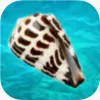Take a look inside 7 images
Assassins of the Sea
Pros: Includes rarely studied scientific concepts, beautiful snail art, gamified learning.
Cons: Complicated gameplay distracts from the lesson; app includes almost no instructions on how to play the game; concepts aren't explored in depth.
Bottom Line: A useful addition only to science classrooms that use the tabletop version of the game, or for use after a thorough playthrough by the teacher.
For classrooms that also have the tabletop version of Assassins of the Sea, this app can likely be played without further orientation for students. For those who haven't played the tabletop version, however, teachers will need to learn how to play the game -- by watching the brief tabletop playthrough on the Killer Snails website or through some other means -- and then explain it to their students. The app itself includes a "tutorial," but it's more an introduction to the cards and symbols than any instruction on how to play the game or what players can do on their turns. The app's intended lessons -- about venomous snail peptides and scientific research -- may also need to be explained by teachers for students to fully internalize them.
The game can be played without logging in, but teachers can also log in with Google Classroom or Clever to integrate with their classroom systems.
Based on the tabletop version of the game, the Assassins of the Sea app is a deck-building game where players take on the role of scientists who acquire and care for (feed) a collection of killer snails from whose venom they harvest peptides to advance scientific research. The basic gameplay has players collecting snail cards and feeding them the correct prey, and then using cards in strategic ways to collect specific peptides from the snails that combine to solve the three mystery cabals.
Gameplay includes building your own set of snails while preventing your opponent(s) from doing the same, and also protecting your resources from the other player(s). Tapping on each card displays a bit of trivia that players will be quizzed on to receive a bonus peptide. Special instant cards can be used to move the game along in your favor by doing things like conducting research, swapping out prey, or causing tsunamis.
Players can play against the computer or against one, two, or three other local people, pass-and-play style, but going back to the main menu or putting an in-progress game down for a while loses your progress. The game includes a brief "tutorial," which is just an orientation to the markings on the cards. To learn how to actually play the game, players will need to look elsewhere.
Playing this game through, students will learn about different types of venomous cone snails and their venom and ecosystems, about the food chain and biodiversity, and about how peptides can be combined to be used for scientific progress. The information presented, however, isn't very deep, and players will come away with mostly surface knowledge about snails. The game could be improved by explaining more about the science behind combining peptides and how that can specifically lead to medical advancements.
This game is based on solid educational concepts and an interesting topic, but the app's design and layout aren't executed well, and its complete lack of in-game instruction will leave those students who haven't played the tabletop version at a loss. The game could be improved by making the layout of the play area more clearly labeled and organized, adding tooltips to explain what's visible on the table, and adding complete instructions, including what options there are on each player's turn. Assassins of the Sea feels like a companion app to the tabletop game and just doesn't stand on its own in its current state.
















